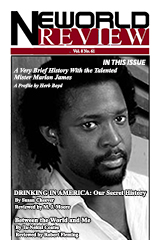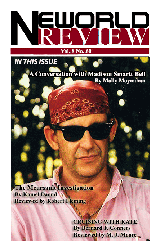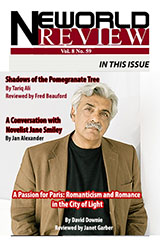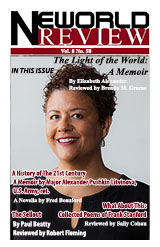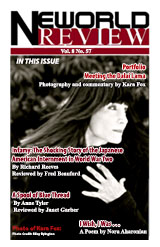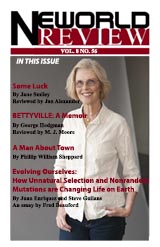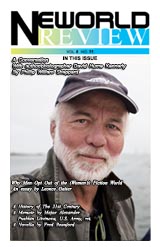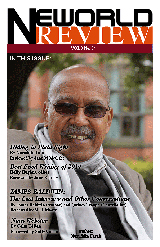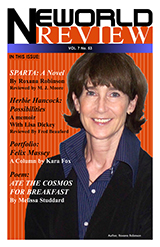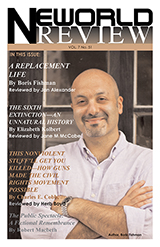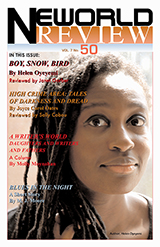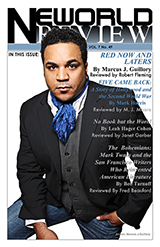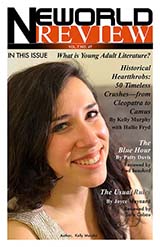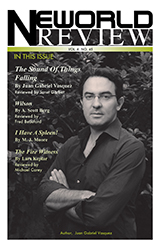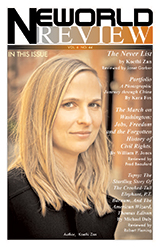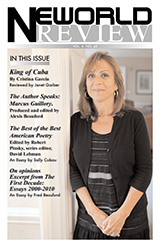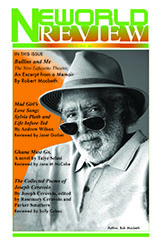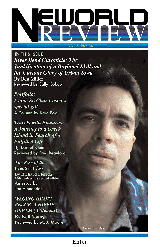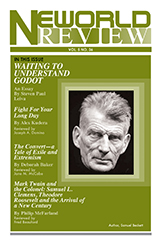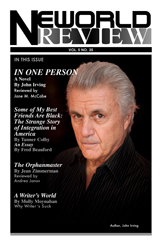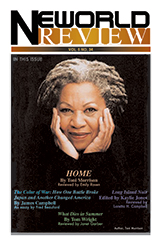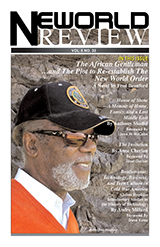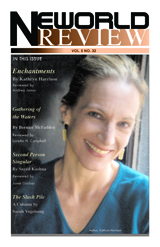
Letter to the Reader:
Smart friends
We at the Neworld Review are now going, once again, into a new year. And it is a year that promises to be as loud, and as rowdy, and as dangerous as the previous year.
Obviously, human beings cannot just sit quietly in a room somewhere in the world, night after night, year after boring year, no matter how many toys they have to play with.
I personally embrace this loud, dangerous, rowdy world, and refuse to bury my head in the sand, or shut up my big mouth (and growing, I might add, thanks to you).
It could be because I once taught Media History, that I tend to think like a historian, in that I think rowdiness is just a part of the human condition…until we further evolve.
***
I don’t know if my great staff shares this attitude with me; but who cares. Let them have their own big ideas!
Isn’t this the real reason why we are going into our ninth year? I would say so.
I love my staff. And, I love all of you discerning readers, whom I consider close, trusted friends.
The unlettered, downtrodden of the world may be the salt of the earth, as the New Testament would have it, but give me a handful of smart, well-read friends, any day.
It’s truly amazing what we can do.
Tell others to join us.
And thanks for clicking on to the Neworld Review.
Fred Beauford
Editor-in-Chief
Publisher
This is a heart warming, inspirational book for those who love nature and gardening; and those who enjoy listening to the beautiful songs of the birds.
This Month's Articles
REVIEWING
Purity
By Jonathan Franzen
Reviewed by Sally Cobau
Life in the Fast Lanes
Once a long time ago, I found myself driving from New Haven, Connecticut to New York City with a law student I’ll call Jim. The reason for our trip was to watch a boxing match.
Having never attended a boxing match, this was a little thrilling to me; but, even more thrilling was the pre-boxing dinner conversation. To summarize, Jim told us that he had gotten into a conversation with his fellow law students in which several of them admitted to being responsible for a person’s death and “getting away with it.”
He related this matter-of-factly, as if it were a common occurrence. For a long time afterwards, I thought of this group as particularly special, made up of smart and “deadly” individuals. It wasn’t until I read Purity by Jonathan Franzen that I revisited my thoughts.
In Purity, the hero, Andreas Wolf, clobbers a foe with a shovel and then buries him in a shallow grave in East Germany. The reason for the killing is simple—a stepfather had sexually abused his stepdaughter and Wolf is in love with this girl.
No punishment seemed too harsh for the perpetrator.
So, too, the reader feels that the killing is perhaps justified. Franzen makes the killing a burden for Wolf that compels him to act a certain way (as could be imagined). And yet because of the tone and style of the novel, a deeper question of moral culpability is lost.
Wolf certainly isn’t in anguish over the murder; he is just worried that he won’t get away with it, which brings me back to the law students.
As related by Jim, they viewed their ....Read More
REVIEWING
M Train
By Patti Smith
Reviewed by Michael Moreau
G! L! O! R! I! A!
Van Morrison, a slightly squat teen rocker from Belfast broke into the top-40 airwaves by owning this song with a howl unlike anything heard by white pop singers before 1964.
Then 10 years later Patti Smith turned it inside out, reshaping it with her own lyrics—a woman in a man’s world, belting it out, a primal scream at one moment, then an incantation—her words folded into and subsuming the original: “Jesus died for somebody’s sins but not mine….My sins my own/They belong to me.”
It wasn’t a rip off, but an Irish lament filtered through New York punk, and even more astonishing, it was sung by a woman.
It was not a rejection of the Irish master, but a reimagining; and, finally, homage.
And that is much of what Smith’s latest book M Train is an homage to the many writers she reveres—mostly men, and none more than her late husband, Fred Sonic Smith of the legendary MC5, musicians.
This is a book about what it means now to be a writer. It goes without saying that Smith is hands-down the finest prose writer of the rock and roll world from which she emerged with the breakthrough Horses album in 1975.
M Train stands both for the Metropolitan Transportation Authority trains she rides from the Village, to the house she rehabs in Rockaway as well as the ride through her memories she invites us to follow her on.
While the Just Kids was about Smith growing into an artist alongside lover and pal Robert Mapplethorpe, M Train is the mature artist, looking back at all she has loved and lost while still approaching life with the wonder of a child—as she says forever ....Read More
REVIEWING
Early One Morning
By Virginia Baily
Reviewed by Janet Garber
Chiara’s Choice
Rome, 1943: A young Italian woman, Chiara Ravello, helplessly witnesses the mass roundup of the Jews in the ghetto. She makes eye contact with a mother loaded onto the trucks with her husband and two children, a toddler girl and a seven-year-old boy. Soundlessly they make a bargain. The mother pries the boy’s fingers off her sleeve. Chiara rushes forward and claims the woman’s son, shouting, “My nephew!”
Chiara is a born caretaker. Orphaned, resolved to spinsterhood following the death of her fiancé, she’s bravely assumed responsibility for her severely epileptic sister. Now she instinctively does the right thing by saving the life of this child although this “adoption” of Daniele Levi has profound consequences on the rest of her life. She devotes herself to her two charges, scrounging for food and shelter, loving and protecting them as a mother would.
The novel skitters back and forth in time from wartime to the 1970’s, skidding to a halt at times in between. Mostly, Baily recounts the story through Chiara’s point of view, though halfway through she switches to the outlooks of three other characters. The person we most want to hear from, of course, is Daniele, a deeply troubled young man, but the author elects to deny us access to his inner thoughts and struggles. As a child he is at first selectively mute; as an adult, he is denied a voice.
Chiara, her sister and Daniele escape to the countryside, to her grandparents’ beat-up cottage, where hungry, cold, and surrounded by German soldiers, they barely manage to survive, mostly due to luck and Chiara’s skill and creativity as a cook. They head back to Rome eventually until the conclusion of the war because there are more provisions and better shelter for them there.
Skipping to the present, we are shocked to learn that Chiara has not heard from Daniele for ten years. Apparently, Chiara has had other choices to make along the way, choices where she’s had no clear moral footing. Her love for Daniele is blinding maternal love, and eclipses all else. She cannot and will not lose him. Another character, her trusted friend, the priest, has chosen shaky moral ground himself, lying to her over the years, playing God by withholding crucial information, a choice he makes out of a desire to protect her from further distress.
Early One Morning is a beautifully written novel. Rome, then and now, is evoked in colorful detail, meaningful to even a casual tourist who recognizes the piazzas, monuments and , ....Read More
REVIEWING
The Story of a New Name
Book Two of the Neapolitan Novels
By Elena Ferrante
Translated by Ann Goldstein
Reviewed by Jane M McCabe
At the end of My Brilliant Friend, the first in the quartet of Elena Ferrante’s Neapolitan novels, Lila marries Stefano, a man from the neighborhood who is comfortably well off because of the grocery stores he owns. Lila is only 16 years old. The wedding is lavish in the tradition of Italian weddings.
Book 2, The Story of the New Name, then begins with Lila and Stefano’s honeymoon. They have gone to a resort along the Amalfi coast:
“They had reached Amalfi in the evening. Neither had even been to a hotel, and they were embarrassed and ill at ease. Stefano was especially intimidated by the vaguely mocking tones of the receptionist and, without meaning to, assumed a subservient attitude…”
Lila proves to be a most uncooperative and unwilling bride. Poor Stefano—he has married the most beautiful, intelligent and difficult young lady in the neighborhood!
“As soon as they were in the room, he tried to kiss her, and she recoiled. Gravely, she opened the suitcase, took out her nightgown and gave her husband his pajamas. That attention made him smile happily at her, and he tried again to grab her. But she shut herself in the bathroom.”
And so with this less than heavenly honeymoon Ms. Ferrante starts The Story of the New Name.
Rare it is that I found reading someone’s work with such intense pleasure. Rare has such a character been rendered in fiction as that of Lila. The last time such a character emerged from pages was when Scarlett O’Hara emerged in...Read More
NOVELLA
A History of The 21st Century
A Memoir By Major Alexander Pushkin Litvinova, U.S. Army, ret.
A Novella by Fred Beauford
Chapter 7
It was because of that event that I first met David. Then he was a 20-year-old writer, and already a graduate student at Columbia. He was a real genius. He wrote for a local paper, and lived near us in Brighton Beach.
He was also a Russian Jew, but like many of the Russian Jews in Brighton Beach, his family had been here since the turn of the last century.
He dogged Mother for weeks after the shooting trying to get an interview for an article he was doing on the Russian Mafia in Brighton Beach.
Of course Mother didn’t talk to him, for obvious reasons. For one, she was now one of the most notorious people in Brighton Beach, and not because she was a “cultural treasure,”
Talk about up and downs, Father. Just as soon as she had put her little theatre on the map, and established herself as an artistic force, all at once, overnight, she transformed into a gangster’s moll!
How unfair, Father! Can you imagine, this middle aged, 57-year-old single mom, with a half black Russian teenage son, a gangster’s moll? I mean, Father, please!
Mother wouldn’t talk to David, so he turned to me, and tried to pump me for information. He was a persistent bastard, to be sure. He wasn’t fat as he became. But I would walk out of my house, and there he was.
Also, I know now that David wanted more from me than just a good story. Even as young and inexperience as he was as a reporter, surely he must have known that I knew little about The Gangster’s life style other than he liked banging my mother.
I know now that what David really wanted was nothing more than to get down on his knees and give me a blowjob.
“P,” he said later, after we had settled into real friendship, without the sex, based partly on our both growing up in Brighton Beach and being Russian, “when I first laid eyes on you, this tall, handsome, well-built, brown-skinned “Russian” with blue eyes no less, I ....Read More
REVIEWING
WHEREVER THERE IS LIGHT (A Novel)
By Peter Golden
Reviewed by M. J. Moore
History. In one word, that genre—history in the broadest, deepest sense—shines a light on why novelist Peter Golden’s second novel is a gem. Golden’s new novel is titled Wherever There is Light and his content illuminates that title in every way.
It’s not that the novel is what’s popularly known as “a historical novel,” because no one is going to confuse this writer with the authors of sprawling Civil War sagas or Renaissance-era bodice-busters. Nor does Wherever There is Light risk becoming a didactic novel, with its story and characters subservient to a message or to lessons.
Instead, in the tradition of W. Somerset Maugham and Irwin Shaw, what Peter Golden has done is to create vivid, complex, conflicted individual characters who interact in each other’s lives and also have their separate journeys and episodes, all of which are set against the turmoil of a violently changing world, decades ago.
The world re-created in this exquisite, deeply textured narrative takes readers from the 1920s through the 1960s. It’s a story dominated by two star-crossed lovers whose complicated interracial romance evolves and develops (against all odds and obstacles) as the epoch of the Roaring Twenties and then the Great Depression is followed by World War Two, the McCarthy Era ‘50s and the mayhem of the 1960s.
There’s Julian Rose, a young Jewish man who escaped post-World War One Europe and Weimar-era Germany to seek his fortune in....Read More
ESSAY
Whither Black Intellectuals?
An essay by Herb Boyd
Nothing invigorates a debate about black intellectuals more than when they disagree among themselves, and their differences become grist for the media. A recent example of this war of words, a takedown in rhetoric occurred back in the spring when Michael Eric Dyson excoriated Cornel West, his former mentor.
Published in the New Republic, the blistering attack went viral all over the Internet, which was clearly part of the author’s intentions. Interested parties waited eagerly for West’s retort, but, for the most part, the pragmatic scholar was momentarily silent, choosing to let the verbal fusillade fade into the ether.
Toward the end of Dyson’s screed, we get at least a glimmer of his motivation for the 10,000 word essay. For several months—if not years—the bile from West had accumulated, necessitating a release.
Dyson said West had assailed him with a barrage of disparaging comments, including that he was a “cheerleader and bootlicker” for President Obama. When West finally broke his silence, he said, “Character assassination is the refuge of those who hide and conceal these issues in order to rationalize their own allegiance to the status quo.”
And thus the bout was on.
Students of African American history and intellectual thought probably heard a familiar ring in the encounter between these two very popular public intellectuals. In the distant black past, there was a similar rift—but far more political--in the abolitionist movement.
In 1843, the National Negro Convention was held in Buffalo, New York. Among the delegates was the Rev. Henry Highland Garnet and the meeting would have long been forgotten except for his speech that called for slave rebellions. His position was opposed by Frederick Douglass, who preferred a less militant approach to leading black intellectual of the era, would disagree with Martin Delany ....Read More
POEM
Plath at the Pillar
A poem by Alan Weltzien
In black stencil Sylvia stares at passing joggers or drivers
from the central concrete pillar anchoring the northbound interstate
lanes along Reeder St.’s north edge in my small college town
where few know her brilliant stanzas or famous suicide.
Few return her steady gaze. It’s that famous head shot,
her strawberry blonde hair, now dark, frames and swings
around her face, a wavy 1950s style; she stares and challenges
you, her lips pursed, sensuously poised, and below her chin,
her surname announces her identity like an old-fashioned
“Wanted’ poster, the “A,” lone central vowel, a black triangle
over a low hyphen, the whole two-dimensional....Read More
REVIEWING
ON ANOTHER NOTE: Making Music at Head Start
By Leah Wells
Reviewed by M. J. Moore
To appreciate fully the sense of wonder, the anticipatory excitement, the poignant feelings of regret, and the constant sense of striving that permeates this unique memoir by musician Leah Wells, all we need to do is recall our own schooling.
Do you remember how galvanized your elementary school classrooms were by the occasional visit from a guest teacher who actually did cool things? A teacher whose arrival heralded a wondrous sense of the creative, the unknown, and perhaps most of all a reprieve from the boredom induced by rote exercises and test preparations?
Such periodic incursions by part-time, visiting faculty were likely a part of the later school years too (either the middle-school epoch or your high school era). Yet, for students of a certain age—that is, for really young kids—the magic is unforgettable.
If only it were all as seemingly effortless and inevitable as a magic act!
But there was nothing effortless or inevitable about the unexpected plunge that folk-music artist and movement specialist Leah Wells took when accepting a last-minute offer to teach in the Head Start program in the Bronx.
She did so for the same reason that the late, great James Cagney showed up one day and made inquiries at Warner Brothers: “I need a job!” Cagney told the studio personnel. As the mother of two sons whose father had recently lost his job (he was dismissed without a severance package, despite years of loyalty as a digital printing house’s night manager), Leah Wells had daily economics tormenting her.
On Another Note is a memoir with a two pertinent subtitles: “Making Music at Head Start” and “A Memoir with Classroom Exercises.” In a way, it’s even more than that.
This memoir reads like a novel, due to the author’s musical command of the English language. Her sentences flow. Her paragraphs are structured like melodies. Her sense of timing is rhythmic without being cornball. Best of alk, there had never been any reason for Leah Wells to travel way up to ....Read More
Neworld Review
Vol. 9 No 62 - 2016
Editor-in-Chief
/Publisher
Fred Beauford
Online Managing Editor
Richard D. O'Brien
Editor-at-Large
Jan Alexander
Associate Editor
Jane M. McCabe
Poetry Editor
Sally Cobau
Senior Editors
Molly Moynahan
Herb Boyd
M. J. Moore
Janet Garber
Director of Photography
Kara Fox
President
Alexis Beauford
Contributing Writers
Michael Carey
Robert Fleming
Steve Fisch: Portfolio
Brenda M. Greene
Robert Macbeth
Emily Rosen
Jane Smiley
Michael Moreau
The Neworld Review is a publication of Fred Beauford, 3183 Wilshire Blvd,
Suite 196,
Los Angeles, CA. 90010.
Material in this publication may not be reproduced in whole or in part without permission. Opinions expressed by contributors do not necessarily reflect the views of the publishers.
Manuscripts should be accompanied by a self-stamped envelope. Online submissions are accepted at [email protected].
Neworld Review cannot be held responsible for unsolicited photographs or manuscripts.
All correspondence to:
Fred Beauford
Editor-in Chief/Publisher
Neworld Review
3183 Wilshire Blvd,
Suite 196,
Los Angeles, CA. 90010
Archived Issues





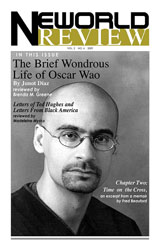
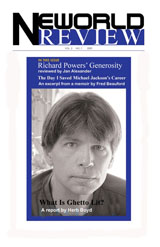

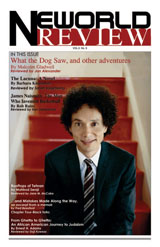
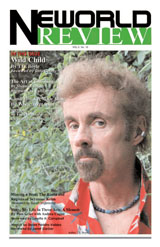
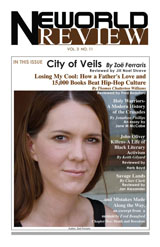
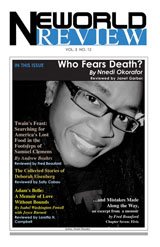
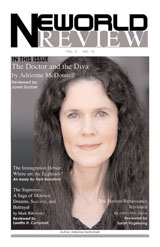
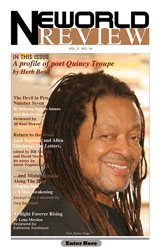
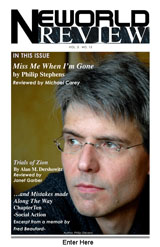

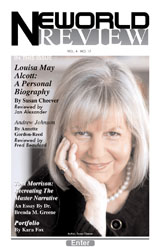
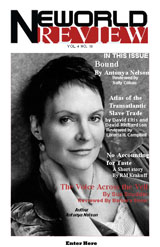
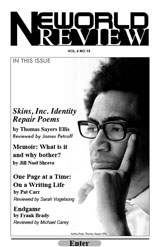
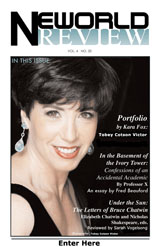

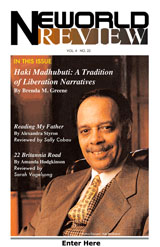
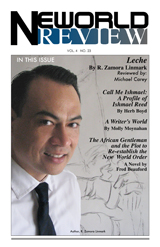
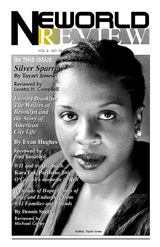
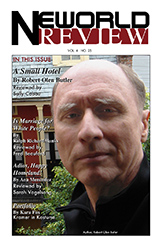
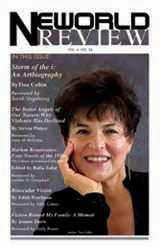

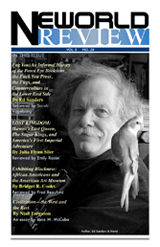
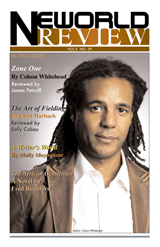
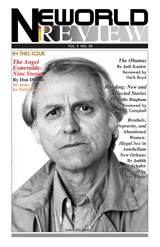
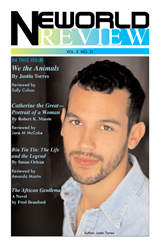
Digital favorites
- Non Gamstop Casinos UK
- Casinos Not On Gamstop
- Mejores Casinos Online
- Siti Casino Non Aams
- Casinos Not On Gamstop
- Gambling Sites Not On Gamstop
- Non Gamstop Casinos
- Online Casinos UK
- Best Non Gamstop Casinos
- Casino En Ligne
- UK Casinos Not On Gamstop
- Best Casino Sites Not On Gamstop 2025
- Best Non Gamstop Casinos
- Mejores Casas Apuestas Online
- Siti Casino Online Non Aams
- Top UK Casino Sites
- Meilleur Casino En Ligne Fiable
- Meilleur Casino En Ligne
- Non Gamstop Casino
- Casinos Not On Gamstop
- Slots Not On Gamstop
- Non Gamstop Casino
- Casinos Not On Gamstop
- Siti Casino Online Non Aams
- Lista Casino Online Non Aams
- Siti Casino
- Meilleur Casino En Ligne En Belgique
- Site De Paris Sportif Bonus
- Crypto Bookmaker
- українські онлайн казіно
- Casino Jeux En Ligne
- Casino Online Bonus Senza Documenti
- Casino En Ligne
- Siti Non Aams Bonus Senza Deposito
- Casino En Ligne Francais
- Casino En Ligne France Fiable
- Meilleur Casino En Ligne 2026
- Casino Online Italia
- オンカジ
